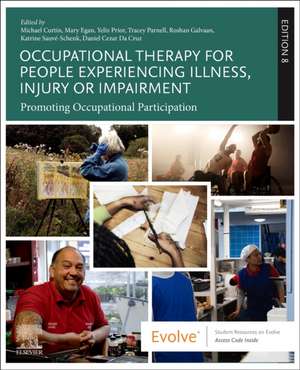Occupational Therapy for People Experiencing Illness, Injury or Impairment: Promoting Occupational Participation: Occupational Therapy Essentials
Editat de Michael Curtin, Mary Egan, Yeliz Prior, Tracey Parnell, Roshan Galvaan, Katrine Sauvé-Schenk, Daniel Cezar Da Cruzen Limba Engleză Paperback – 8 ian 2025
Now in its eighth edition, it reflects significant developments within the occupational profession and the contexts of the delivery of health and social care when working with people who experience illness, injury or impairment to promote occupational participation. It is highly regarded for its level of detail, its practical approach, and the breadth of its content, with input from multiple authors from around the world.
Fully updated and built around the professional concepts and processes to promote occupational participation this invaluable resource will enable occupational therapists link theory with day-to-day practice, reflect on the knowledge, expertise and attitudes that inform their work and practice in a critically reflexive way.
Preț: 354.14 lei
Preț vechi: 464.33 lei
-24% Nou
Puncte Express: 531
Preț estimativ în valută:
67.77€ • 70.33$ • 56.65£
67.77€ • 70.33$ • 56.65£
Carte disponibilă
Livrare economică 18 februarie-04 martie
Livrare express 08-14 februarie pentru 167.79 lei
Preluare comenzi: 021 569.72.76
Specificații
ISBN-13: 9780323882927
ISBN-10: 0323882927
Pagini: 840
Dimensiuni: 191 x 235 x 34 mm
Greutate: 1.58 kg
Ediția:8
Editura: Elsevier
Seria Occupational Therapy Essentials
ISBN-10: 0323882927
Pagini: 840
Dimensiuni: 191 x 235 x 34 mm
Greutate: 1.58 kg
Ediția:8
Editura: Elsevier
Seria Occupational Therapy Essentials
Cuprins
SECTION 1 CONTEMPORARY REFLECTIONS ON OCCUPATIONAL THERAPY
1. Decoloniality in occupational therapy practice: preparation and readiness
2. Critical perspectives in occupational therapy: problematising practice to address the socio-political shaping of occupation
3. A political project for occupational therapists
4. Social occupational therapy: principles for action towards participation
5. Analysing the practice context: a critical step in meeting professional obligations
6. Occupation
7. Reflecting on the contribution of the dimensions of the environment to occupational participation
8. The continual evolution of the occupational therapy profession
SECTION 2 UNDERSTANDING AND EXPLORING OCCUPATIONAL PARTICIPATION
9. Professional reasoning
10. An occupation, capability and wellbeing framework for occupational therapy
11. The canadian model of occupational participation (canmop)
12. The collaborative relationshipfocused practice and the canadian occupational therapy practice process framework
13. Process of exploring occupational participation
14. Exploring occupational needs and expanding occupational possibilities of collectives
15. Exploring the impact of the environment on occupational participation
16. Exploring occupational participation using the canadian occupational performance measure
17. Exploring occupational participation using task, activity and occupational analyses
18. Dynamic performance analysis
19. Co-designing plans to access, initiate and sustain occupational participation
20. Exploring safety and risk to promote occupational participation
SECTION 3 SKILLS AND STRATEGIES TO PROMOTE OCCUPATIONAL PARTICIPATION
21. Advocacy
22. Education
23. Health promotion
24. Lifestyle and self-management
25. Sexuality
26. Work participation
27. Occupational performance coaching
28. Cognitive orientation to daily occupational performance (co-op) approach
29. Home modification and universal design
30. Embracing a critical community development orientation and strategy in occupational therapy practice
SECTION 4 SKILLS AND STRATEGIES TO SUPPORT THE PROMOTION OF OCCUPATIONAL PARTICIPATION
31. Assistive technology
32. Walking and falls
33. Wheeled mobility and seating systems
34. Driving and transportation for community mobility
35. Moving and positioning of people
1. Decoloniality in occupational therapy practice: preparation and readiness
2. Critical perspectives in occupational therapy: problematising practice to address the socio-political shaping of occupation
3. A political project for occupational therapists
4. Social occupational therapy: principles for action towards participation
5. Analysing the practice context: a critical step in meeting professional obligations
6. Occupation
7. Reflecting on the contribution of the dimensions of the environment to occupational participation
8. The continual evolution of the occupational therapy profession
SECTION 2 UNDERSTANDING AND EXPLORING OCCUPATIONAL PARTICIPATION
9. Professional reasoning
10. An occupation, capability and wellbeing framework for occupational therapy
11. The canadian model of occupational participation (canmop)
12. The collaborative relationshipfocused practice and the canadian occupational therapy practice process framework
13. Process of exploring occupational participation
14. Exploring occupational needs and expanding occupational possibilities of collectives
15. Exploring the impact of the environment on occupational participation
16. Exploring occupational participation using the canadian occupational performance measure
17. Exploring occupational participation using task, activity and occupational analyses
18. Dynamic performance analysis
19. Co-designing plans to access, initiate and sustain occupational participation
20. Exploring safety and risk to promote occupational participation
SECTION 3 SKILLS AND STRATEGIES TO PROMOTE OCCUPATIONAL PARTICIPATION
21. Advocacy
22. Education
23. Health promotion
24. Lifestyle and self-management
25. Sexuality
26. Work participation
27. Occupational performance coaching
28. Cognitive orientation to daily occupational performance (co-op) approach
29. Home modification and universal design
30. Embracing a critical community development orientation and strategy in occupational therapy practice
SECTION 4 SKILLS AND STRATEGIES TO SUPPORT THE PROMOTION OF OCCUPATIONAL PARTICIPATION
31. Assistive technology
32. Walking and falls
33. Wheeled mobility and seating systems
34. Driving and transportation for community mobility
35. Moving and positioning of people


